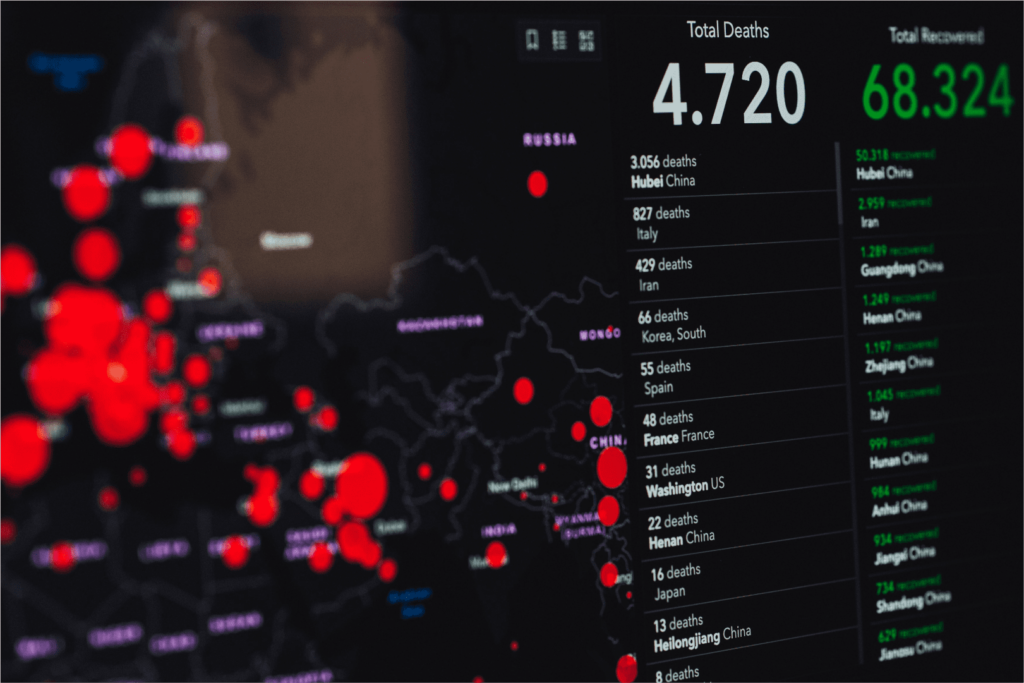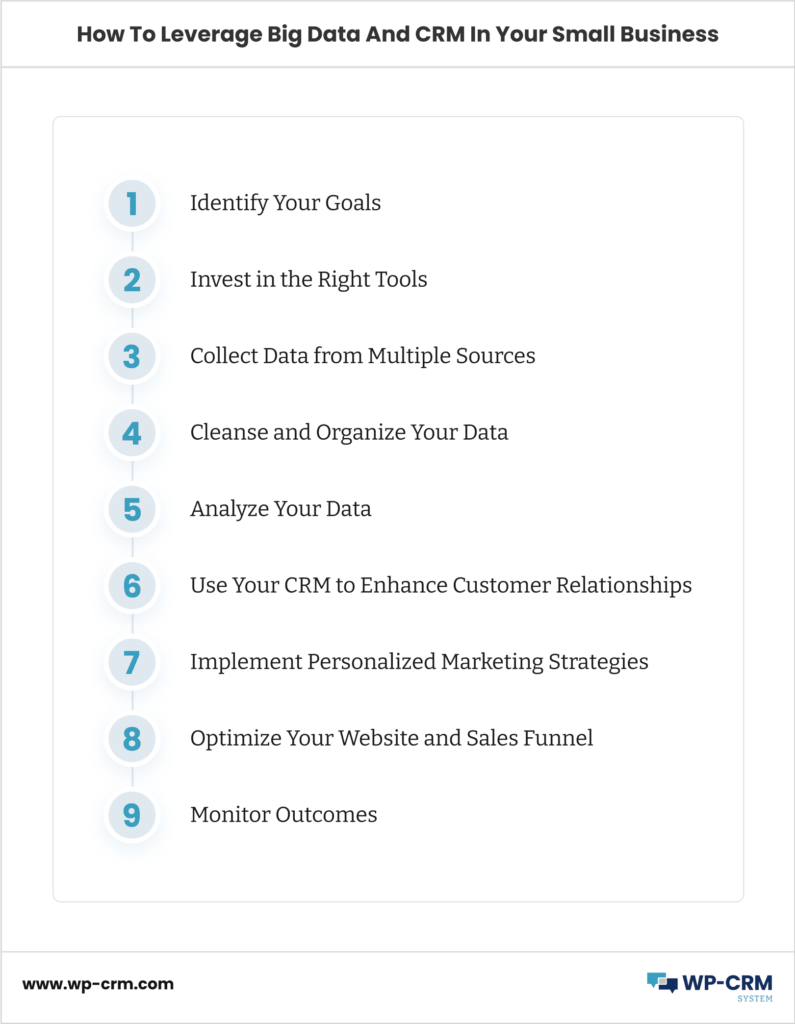How Big Data And CRM Can Enhance Your Small Business
Small business owners need to make careful steps when it comes to getting new customers on board. This is mainly because they have limited resources and can’t really afford a lot of time waste and failed deals. So, every decision needs to rest on solid insights gained from big data and CRM systems that contextualize the information available.
Every salesperson knows how disappointing it is to do detailed research on a prospect only to contact the wrong person in the organization. In order to close a deal, you need either a decision-maker or a gatekeeper within the company you are trying to partner with.
In this article, we will explain the difference between big data and CRM, and suggest a few tips to enhance them into your small business sales strategy.
Big Data Definition

Big data refers to the collection of large datasets from various sources like customer interactions, market research studies, financial transactions and more. This information is usually too large and complex for traditional software programs to analyze properly.
The characteristics of big data are volume, velocity, and variety of data types. These datasets often contain valuable insights. You can use them to gain a competitive edge in a given industry or to identify new business opportunities.
The availability of big data has allowed businesses to use vast amounts of information. By analyzing this data, they can identify patterns, trends and correlations that would be impossible to detect through traditional methods.
Big data analytics not only help businesses improve their internal functions but also enable them to understand their customers better. This helps them personalize marketing messages, enhance customer engagement and retention, and ultimately boost revenue and profitability.
Big Data vs Little Data
Although big data brings a lot of benefits to small businesses, the biggest challenge is exactly the lack of focus of that data. In order to make this data relevant to the task at hand, for example, to establishing an editorial partnership, you need a specific fraction of this dataset – in this case, an editorial contact.
This is where the concept of “little data” comes in. It refers to the process of analyzing big data, identifying meaningful insights, and extracting the specific piece of information that would be useful to the business. This specific piece of information is often what is necessary to make a decision or take action.
One way to think of the difference between big data and little data is by using the metaphor of a library. Big data is like a vast library with millions of books. Little data is like the specific book that you need for your research or to find certain information.
How Are Big Data And CRM Systems Connected?
A good way to extract the relevant ‘little’ data you need is by using a small business CRM system like WP-CRM. So, why make the comparison big data vs CRM? Here’s the thing. It is closer to the mind to physically go through all that information available to you. However, this can lead to a waste of resources.
Big data provides businesses with a vast amount of information that can be used to gain insights and identify patterns, while CRM is specifically focused on managing customer interactions and relationships. CRM is used to track customer behavior, preferences, and history with a business in order to provide personalized and effective communication.
Therefore, by combining big data insights with CRM capabilities, businesses can gain a comprehensive understanding of their customers. This way, it is easier (and faster!) to tailor their communication to drive engagement and loyalty.
How To Leverage Big Data And CRM In Your Small Business
By using big data in combination with CRM tools, businesses can gain a deeper understanding of customers and drive engagement and loyalty. Here are the main steps to use them to help your small business.

Identify Your Goals
The first step to leveraging big data and CRM in your small business is to identify your goals. What is it that you want to achieve? Are you looking to improve customer engagement or increase sales? Do you want to improve your marketing campaigns or optimize your website? By identifying your goals, you can focus your efforts on the specific data that will help you achieve them.
Invest in the Right Tools
Tools like a CRM software platform, data mining tools, and analytics software can help you gather and analyze large amounts of data quickly and efficiently. Additionally, investing in the appropriate technology can help your business scale and automate tasks that otherwise require more labor.
Collect Data from Multiple Sources
Make sure you collect data from multiple sources. This includes social media platforms, your website, email marketing campaigns, customer surveys, public data sources, and more. Collecting data from a variety of sources can help you gain a more comprehensive picture of your customers and their behavior.
Cleanse and Organize Your Data
Once you have collected your data, it’s important to cleanse and organize it. Remove any duplicate or irrelevant data and ensure that the data is organized in a way that makes sense. Clean and organized data is essential for accurate analysis and decision-making.
Analyze Your Data

Analyzing your data is where the real value comes in. By utilizing analytics tools, machine learning algorithms, and predictive modeling, you can uncover valuable insights into your customers’ behavior. You can then use your finding to identify patterns that might be otherwise difficult to detect. These insights can be used to make informed decisions in areas like sales, marketing, and customer engagement.
Use Your CRM to Enhance Customer Relationships
With the insights gained from big data analysis, you can use your CRM to enhance customer relationships. By tracking customer behavior, preferences, and past interactions with your business, you can personalize your communication and make your customers feel valued. This can drive customer loyalty and increase customer lifetime value.
Implement Personalized Marketing Strategies
Leveraging both big data and CRM allows businesses to develop personalized marketing strategies that speak directly to their customers’ needs and interests. By analyzing customer data, businesses can identify specific segments of their audience, create targeted messaging, and deliver personalized offers to drive conversion rates.
Optimize Your Website and Sales Funnel
Utilizing big data and a CRM allows businesses to optimize their website and sales funnel to better serve their customers. By analyzing customer behavior on your website and tracking activities within your sales funnel, you can identify opportunities to improve conversion rates. This way, you can also tailor the user experience, and upsell or cross-sell additional products.
Monitor Outcomes
Like any other investment, it’s important to monitor the outcomes of leveraging both big data and CRM in your business. Track the results of your efforts consistently to identify areas for improvement and ensure that your strategies are effective over time.
Wrapping Up
Big data and CRM are powerful tools for small businesses looking to build more effective, personalized customer relationships and drive profitable growth. By identifying business goals, investing in appropriate technology, and implementing a data collection and analysis strategy, small businesses can create targeted marketing strategies, optimize their sales funnel, and ultimately drive customer loyalty.
